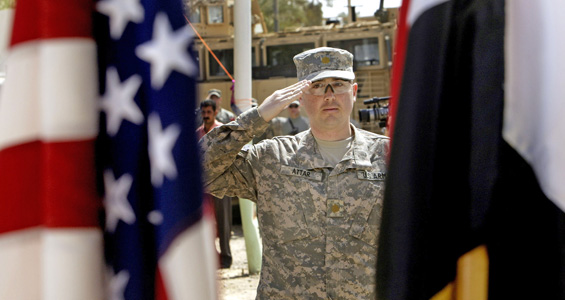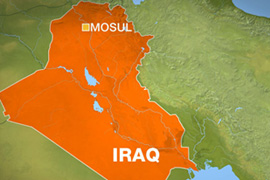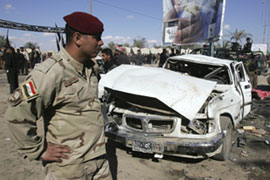Could US troops remain in Iraq?
Pentagon mulls post-election scenarios in Iraq to determine whether withdrawal proceeds.

 |
| US generals have indicated that post-election violence could influence whether troop withdrawal later this year continues undeterred [GALLO/GETTY] |
As healthcare, the economy, and the war in Afghanistan continue to dominate the headlines in US media, many Americans are forgetting the predominant role that the US deployment in Iraq played in the 2008 presidential election.
Analysts believe that Barack Obama was able to distinguish himself in a crowded field of Democratic candidates by declaring his opposition to the war early on.
| special report |
 |
He made it clear that he would fulfil his campaign promises to withdraw from Iraq once he became president.
Just over a month after taking office, Obama took to the stage at a large Marine base and said: “Let me say this as plainly as I can: by August 31, 2010, our combat mission in Iraq will end.”
Obama’s first real challenge to his Iraq policy will be determined on March 7, when nearly 19 million Iraqis head to the polls.
Ray Odierno, the top US General in Iraq, recently told reporters at the Pentagon about his views of post-election scenarios: “One, is it [the March 7 election] happening in a peaceful manner? If there’s a problem in forming the government, does it translate into violence? So that’ll be a big piece of this, whether it does or not. And right now we’re not sure. We think so far it will probably go fairly smoothly, but we’ll wait to see.”
Odierno seemed to indicate that he believes he has options regarding the withdrawal of 50,000 troops by September 1, 2010.
“I have a course of action that could potentially say I need some people to stay a little bit longer, or we might not quite go down to – I have those prepared to submit and ask for approval.”
Northern Iraq deployment
 |
| Despite a drop in violence in much of Iraq, tensions remain high in the north |
There are published reports – that the Pentagon has not denied – that say Odierno is considering asking for a combat brigade to remain in northern Iraq past the deadline.
The question now is whether Obama will consider advice from US generals and renege on his campaign promise.
At Thursday’s White House press briefing, the questions were almost entirely about health care legislation.
It was not until Camille El Hassani, Al Jazeera’s White House producer, shouted out a question about the withdrawal deadline to Robert Gibbs, the press secretary, that the issue was addressed.
“I think General Odierno in a briefing at the Pentagon said that, as any general would and as any Pentagon [official] would expect, that a host of contingency plans be prepared for any number of different scenarios,” Gibbs said.
He went on to say that the White House team believes they are “strongly on track to meet the president’s promise of withdrawing our combat brigades by the end of August.”
With that he walked away and has yet to be pushed on whether Obama could possibly change the deadline.
Wrong message
Critics of the war say that would be a mistake. Christopher Preble, the director of foreign policy studies at the Cato Institute, says even hinting that the US could change the scheduled troop redeployment sends the wrong message.
“Most Iraqis, the vast majority of Iraqi’s want desperately to believe that Americans are leaving,” Preble said.
“If we don’t leave according to the time-table that President [George] Bush negotiated with Prime Minister Nouri al-Maliki, that was endorsed by the Iraqi Parliament, that will feed into the narrative, the most Anti-American elements in Iraq and in the region that this was never about handing over power to the Iraqis,” Preble says.
“It was about the United States maintaining a base of operation in Iraq.”
Preble says keeping troops in Iraq could also be a psychological blow to US troops, who are expecting to focus on one war instead of two. Pentagon officials say they can do both and adamantly insist that they have enough troops to be able to keep up the rotations.
If one looks at the sheer number of forces in the US military, that seems to be logical, but officials will tell you that staying in Iraq would stretch the force in other ways.
There are certain specialities that are needed in both theatres of operation; explosive ordinance disposal teams and engineers, for example, would be stretched to the limit.
There is also the issue of equipment and the logistical challenge of moving an additional 30,000 troops into Afghanistan. In order to get the majority of troops into that country by this summer, it is going to take most of the air assets the military has at its disposal, a capability also needed in Iraq.
The military has suggested that one scenario for extending the deadline for withdrawal would involve a request from the Iraqi Government for US forces to remain in Iraq for a longer period of time.
Iraqi government request?
 |
| Some believe a rise in post-election violence could persuade US troops to stay [REUTERS] |
Samir Shakir M Sumaida’ie, the Iraqi ambassador to the US, said that is unlikely to happen.
“I don’t see the results of the elections impacting that (pullout) unless there is a huge outbreak of violence and the Iraqi government requests more assistance which is unlikely despite this bout of violence recently. I don’t see that this would be needed.”
US officials say they expect a relatively smooth election, which would allow the military draw-down to continue unchanged. Nevertheless, General Odierno says he will wait 60 days after the votes are cast before making a decision on which troops can go home, or if he wants them to stay.
That gives Obama just two months before he is asked to make yet another decision that will impact America’s involvement overseas and reflect on his legacy of promises.